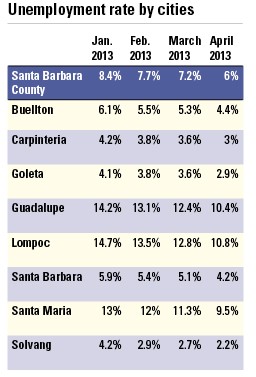The Santa Maria Valley is on the upswing, and builders and businesses are taking note.
In April, Santa Maria saw its unemployment rate dip below 10 percent for the first time in more than four years, according to a report released by the Santa Barbara County Workforce Investment Board on May 17.
“Going below double digits is significant,” said Dave Cross, director of the Economic Development Commission arm of the Santa Maria Valley Chamber of Commerce. “It’s showing that the economy is starting to improve.”
While Santa Maria, Lompoc, Buellton and Guadalupe still have unemployment rates higher than the rest of the region, joblessness in the area is falling notably. Business leaders say agriculture, viticulture, manufacturing and housing construction are leading the way.
“What’s going on now is a gradual rebounding of those sectors that are influencing the northern part of our county,” said Raymond McDonald, executive director of the Workforce Investment Board. “There does seem to be a small pickup in some construction. I’m not sure whether that’s housing or commercial, but there was a small pickup in that area. We’re also seeing a small rebound in some seasonal agriculture jobs.”
The Workforce Investment Board, a public-private partnership run through the County of Santa Barbara, has identified six so-called industry clusters for the county. These sectors, where it expects to see the most growth, are health care, energy and the environment, building and design, technology and innovation, businesses support services and agriculture, tourism and wineries.
“Finally getting that unemployment rate under the double digits — it’s still uncomfortably high — but we’re finally seeing that improvement,” McDonald said.

Tourism is the No. 1 industry in South Santa Barbara County and UC Santa Barbara has hatched many successful technology startups, but North Santa Barbara County has traditionaly relied on agriculture and manufacturing as its mainstays.
Cross with the Economic Development Commission noted that wineries in Lompoc and Buellton are doing very well and have expanded out of the Santa Ynez Valley to become a sizeable economic force in the Santa Maria Valley as well.
Developers who are hoping to get out ahead of the anticipated recovery in the Santa Maria Valley are making plans to build new housing to meet the demands of a larger work force.
Santa Barbara-based developer The Towbes Group received final approvals from the Santa Maria City Council on May 21 to to build a $40 million upscale downtown apartment project.
Towbes Group President Craig Zimmerman said the firm is looking at several economic factors that indicate the Santa Maria Valley is on the rise. “There’s the new hospital [Marian Regional Medical Center], the growth of [Allan] Hancock College, we’re also seeing growth at the Santa Maria airport, and Vandenberg still produces lots of jobs.”
The 262-unit Hancock Terrace apartment complex will be designed with white-collar workers in mind. The project is also part of a master plan by the city to make downtown Santa Maria a more pedestrian-friendly, mixed-use city core.
“Over the last decade you’ve seen a lot of for-sale housing but not a lot of high-quality rental housing with lots of amenities in a more urban walkable area,” Zimmerman said. “We’re hoping this will have a real kind of vibrant feel.”
Towbes Group is set to break ground on the complex in late 2013 or early next year.
“To a certain degree this project is on the leading edge of the resurgence, which we think will lead to more retail and shopping, more jobs and ultimately greater demand for housing,” Zimmerman said.






 Print
Print Email
Email
















